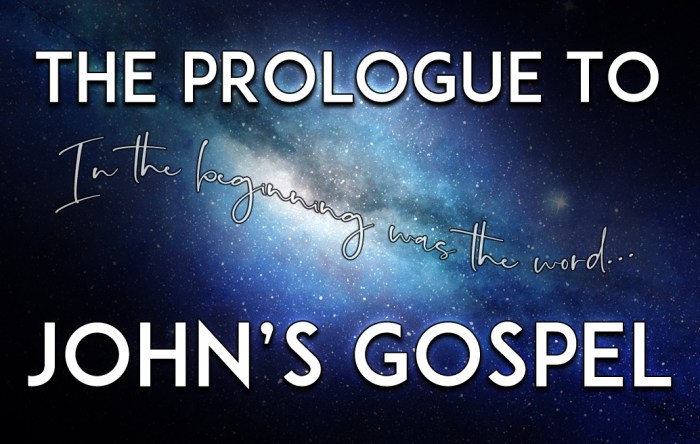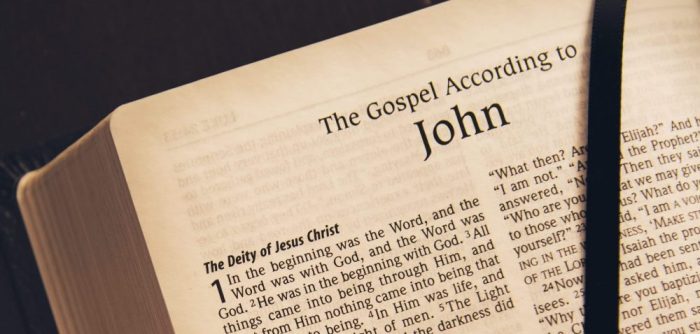As the prologue of the Gospel of John takes center stage, this opening passage beckons readers into a world crafted with exquisite detail and profound theological insight, ensuring a reading experience that is both absorbing and distinctly original.
This captivating introduction establishes the foundation for the rest of the gospel, providing a glimpse into the divine nature of Jesus Christ, his role in creation and incarnation, and the purpose of the gospel itself.
Introduction

The Gospel of John is the fourth book of the New Testament, traditionally attributed to the apostle John. It presents a unique and profound perspective on the life and teachings of Jesus Christ, emphasizing his divine nature and his role as the savior of humanity.
The prologue of the Gospel of John (John 1:1-18) serves as a foundational introduction to the rest of the book. It provides a theological framework for understanding Jesus’ identity, his relationship with God the Father, and his mission on earth.
Significance of the Prologue
The prologue establishes the following key themes:
- Jesus’ pre-existence and eternal nature
- Jesus’ role as the Word of God, through whom God created the world
- Jesus’ incarnation as a human being
- Jesus’ purpose to bring light and life to the world
These themes set the stage for the rest of the Gospel of John, which unfolds the story of Jesus’ ministry, miracles, teachings, death, and resurrection.
The Divine Nature of Jesus Christ

The prologue of the Gospel of John establishes Jesus’ pre-existence and divine nature, setting him apart as more than just a human teacher or prophet. This section explores the use of terms such as “Word” and “Logos” to describe Jesus’ relationship with God the Father, providing evidence from the prologue that supports the deity of Christ.
The Pre-Existence of Jesus
The prologue declares that Jesus existed before the creation of the world. Verse 1 states, “In the beginning was the Word, and the Word was with God, and the Word was God.” This verse establishes Jesus’ eternal existence, as he was present with God from the very beginning.
The Divine Nature of Jesus
The prologue uses the term “Logos” (Word) to describe Jesus. In Greek philosophy, the Logos was a divine principle that represented the rational order of the universe. By applying this term to Jesus, John asserts that Jesus is the embodiment of divine wisdom and reason.
The Prologue of the Gospel of John is a profound and poetic introduction to the nature of Jesus Christ. It begins with the famous line, “In the beginning was the Word, and the Word was with God, and the Word was God.”
This passage is full of rich theological language that has been interpreted and debated for centuries. If you’re interested in exploring this topic further, check out this article about Manuel’s fondness for Mondays a manuel le gustan los lunes. . It offers a unique perspective on the Prologue of the Gospel of John.
Verse 14 further declares, “And the Word became flesh and dwelt among us, full of grace and truth.” This verse highlights Jesus’ incarnation as a human being while emphasizing his divine nature.
Examples from the Prologue
- Verse 1: “In the beginning was the Word, and the Word was with God, and the Word was God.”
- Verse 3: “All things were made through him, and without him was not anything made that was made.”
- Verse 10: “He was in the world, and the world was made through him, yet the world knew him not.”
These verses establish Jesus’ pre-existence, his role in creation, and his divine nature. They provide a strong foundation for the understanding of Jesus as the divine Son of God throughout the rest of the Gospel of John.
The Creation and Incarnation: Prologue Of The Gospel Of John

The prologue of John’s Gospel presents Jesus as the divine Word who was present at the creation of the world. This role is significant because it establishes Jesus’ authority and power as the creator and sustainer of all things.
The incarnation of Jesus, described in John 1:14, fulfills the Old Testament prophecies and brings salvation to humanity. The Word becoming flesh signifies the divine nature of Jesus taking on human form, allowing him to interact with and redeem humankind.
Significance of “The Word Became Flesh”
- God’s presence with humanity:The incarnation symbolizes God’s desire to dwell among his people and establish a personal relationship with them.
- Demonstration of God’s love:By becoming human, Jesus demonstrated God’s love for the world, sacrificing himself to save humanity from sin and death.
- Bridge between God and humanity:Jesus’ incarnation serves as a bridge between God and humanity, allowing for communication, reconciliation, and salvation.
- Model for human living:Through his life and teachings, Jesus provided a model for human living, exemplifying love, compassion, and obedience to God’s will.
The Witness of John the Baptist
John the Baptist played a pivotal role in preparing the way for Jesus’ ministry. As a respected prophet, John baptized Jesus in the Jordan River, an event that marked the beginning of Jesus’ public life.
John’s Baptism of Jesus
John’s baptism was not merely a ritual purification but a symbolic act that signified the transfer of authority from John to Jesus. The descent of the Holy Spirit upon Jesus at his baptism confirmed his divine nature and empowered him for his mission.
John’s Testimony, Prologue of the gospel of john
John’s testimony about Jesus was crucial in establishing his authority and credibility. John publicly proclaimed Jesus as the “Lamb of God who takes away the sin of the world” (John 1:29). This declaration highlighted Jesus’ role as the Savior and the one who would fulfill the Old Testament prophecies.
John’s Role as a Witness
- Prepared the way for Jesus’ ministry by preaching repentance and baptizing people.
- Baptized Jesus, signifying the transfer of authority and the beginning of his public life.
- Publicly proclaimed Jesus as the Messiah and the Savior.
- His testimony helped to establish Jesus’ authority and credibility.
The Reception of Jesus

The prologue of the Gospel of John foreshadows the mixed reception that Jesus received during his ministry. While some people believed in him, others rejected him.The reasons for this mixed reception are complex. Some people were drawn to Jesus’ message of love and forgiveness, while others were offended by his claims to be the Son of God.
Some were impressed by his miracles, while others dismissed them as tricks.The statement “He came to his own, and his own people did not receive him” (John 1:11) is a powerful indictment of the Jewish people who rejected Jesus. It is a reminder that even those who are closest to us may not always accept our message.
The Purpose of the Gospel
The Gospel of John was written with a specific purpose, as stated in the prologue (John 1:18). The prologue serves as an introduction to the gospel, setting the stage for the rest of the narrative.
The purpose of the Gospel of John is to reveal the identity of Jesus Christ and to lead people to faith in Him. The prologue accomplishes this by presenting Jesus as the divine Son of God who became flesh and dwelt among us.
Revealing Jesus’ Identity
- The prologue declares that Jesus is “the only begotten Son” of God (John 1:18).
- It also states that Jesus is “the Word” who was with God in the beginning and through whom all things were created (John 1:1-3).
- These statements establish Jesus as the eternal, pre-existent Son of God, who is equal with God in nature and power.
Leading People to Faith
- The prologue also emphasizes the importance of faith in Jesus for salvation.
- It states that Jesus came to give light to the world and that those who believe in Him will not perish but have eternal life (John 1:4-5, 12).
- The prologue thus serves as an invitation to readers to believe in Jesus and to receive the gift of salvation that He offers.
Question Bank
What is the significance of the term “Logos” in the prologue?
The term “Logos” refers to Jesus Christ and highlights his divine nature as the Word of God, existing eternally with the Father.
How does the prologue establish Jesus’ role in creation?
The prologue states that “all things were made through him, and without him was not anything made that was made” (John 1:3), indicating that Jesus was the agent of creation.
What is the purpose of the Gospel of John, as stated in the prologue?
The prologue declares that the gospel was written “that you may believe that Jesus is the Christ, the Son of God, and that by believing you may have life in his name” (John 20:31).